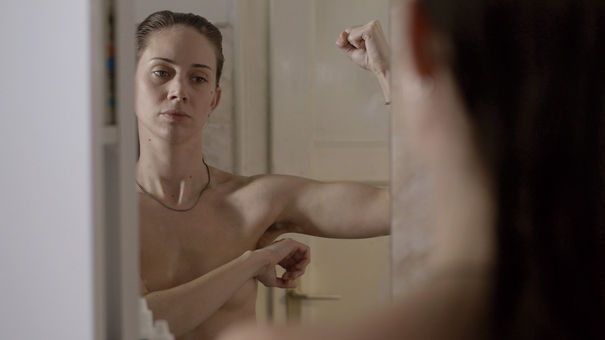Review: Transition
written by Andreea Pătru

Transition
Milica Tomović's TRANSITION / TRANZICIJA (2016) is about the changes and vulnerability of a woman who cannot identify with her assigned gender. The Serbian director focuses on her character’s remarkably played inner struggle, leaving behind the judgement calls of such a controversial topic. While other gender-challenging films focus on the scandalous aspect and on suppressing one's masculine or feminine features, TRANSITION is rather about the journey and the courage of becoming your true self.
The film sets the tone with a defining scene of the boyish Jana who does a little bit of role-playing in the mirror, while combing her hair and admiring her imagined self. She proudly flexes her muscles, and we can see a hint of her full-grown armpit hair. As the story unfolds, we learn that these are the last two days with her beloved ones before leaving to secretly make a crucial adjustment in her life. Even if she is not completely honest with the entire bunch, telling them that she is leaving to pursue her studies in Michigan, some of her friends are already aware of her actual intentions.
The contrast between her bold decision and the way she is perceived is a nice addition to the plot and makes it even more surprising. She is repeatedly called good-looking or beautiful, even though she does not have a feminine attitude or posture. While she splendidly enacts the burden of her life-changing decision, there is no background information about her past or reasoning. It is not obvious if Jana came up with her choice as a part of a coming-of-age story, like in Céline Sciamma’s TOMBOY (2011). It does not look like a phase – although young and rebellious, playing in a rock band, Jana is a fully-grown woman who does not seem gender-confused. The director brings a fresh look on gender reassignment without the typical moralist discourse and prefers to focus on Jana’s difficult decision. The slow pace of the editing builds up the tension she must be going through, but also gives a sort of fluidity that comes from the feeling of Jana being conciliated with her decision.
Moreover, the battle between social expectations and Jana’s internal feelings of being uncomfortable with herself is cleverly expressed through a scene between her ex-lover confronting her departure. The use of over-the-shoulder shots functions perfectly to articulate Jana’s reluctance to deal with the deadweight of her decision and hints at the difficulty of voicing out loud her desire to change. With very few frontal shots showing Jana’s contentment with her option, the character realises that this gain of confidence will cost her the loss of her beloved ones.
And while one might feel the need for more detailed premises for this transition, its mysterious path is the one that makes it original. In the end, it is Milica Tomović’s merit to create a piece that has more to do with mood rather than with details out of the flexibility of sex and gender in a simple natural way.

